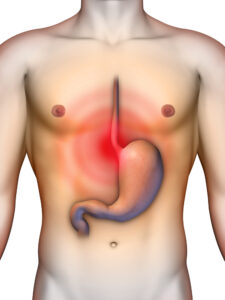June 20, 2020 | Black & Kletz Allergy

The relationship between these 4 conditions has actually been very well studied in a model known as the “allergic march” or “atopic march.”
The allergic march describes how children who have early allergic manifestations, such as eczema or food allergies, are at a higher risk of developing other allergic manifestations, specifically respiratory allergies, later in life.
Researchers at Children’s Hospital of Philadelphia (CHOP) studied the progression of various allergic disorders in a cohort of 130,000 children. They found that children who had eczema and food allergies in early childhood are much more likely to develop respiratory allergies such as allergic rhinitis and asthma later on in life.
Interestingly, their recent analysis also demonstrated that children with skin and respiratory allergies in early childhood are also much more likely to develop eosinophilic esophagitis (EoE) later in life. They also found that children with EoE were at a higher risk of developing allergic rhinitis compared with healthy children.
It is now believed by researchers that eosinophilic esophagitis is also a part of the cascade known as the atopic march. This information is important as it demonstrates that we need to be on the watch for symptoms of EoE in highly allergic children, not just adults.
Eosinophilic esophagitis is an inflammatory disorder involving the esophagus (i.e., food pipe). It occurs in about 1 in 2,000 people. The majority of patients with EoE are atopic (i.e., allergic). In normal individuals, there are no eosinophils (i.e., the “allergy” white blood cells) on the inner lining of the esophagus. In patients with EoE, however, there is an accumulation of eosinophils in the esophagus. The presence of eosinophils in the esophagus causes a chronic inflammation in the esophagus since these eosinophils release chemicals into the surrounding tissue. It is the reaction of the tissue in the esophagus to these chemicals that leads to the unwanted gastrointestinal symptoms of EoE. The symptoms of eosinophilic esophagitis may include difficulty swallowing (especially solid foods), food-getting- stuck-in-the-throat feeling, esophageal reflux, regurgitation of food, abdominal pain, chest pain, weight loss, poor appetite, and in extreme cases, impaction of food in the esophagus. In children, the symptoms may also include vomiting, feeding difficulties, difficulty eating, irritability, and/or failure to thrive.
In many individuals, food allergies play a role. Specific food allergens will act as triggers and thus cause the undesirable symptoms associated with EoE. In eosinophilic esophagitis, it is more challenging to establish the role of foods since the reactions to foods are usually delayed, as they may develop over days, making it more difficult to identify a specific food as the trigger. The most common food triggers for EoE are milk, wheat, egg, and soy.
Environmental allergies to dust mites, molds, pollens, and animals possibly play a role in eosinophilic esophagitis. For some individuals, their EoE seems to worsen during the pollen seasons in the Spring and Fall.
In addition to allergic rhinitis, asthma, food allergies, and eczema, there are other risk factors for the development of eosinophilic esophagitis. EoE is more common in younger adults (i.e., average age of 34 years old) and is also more common in males (i.e., 65% are males). There may be a genetic predisposition towards the condition in some families.
Confirmation of the diagnosis of eosinophilic esophagitis entails endoscopic biopsy of the esophageal mucus membrane by a gastroenterologist with the demonstration of an excessive accumulation of eosinophils. Once the diagnosis is confirmed, the patient should see a board certified allergist such as the ones at Black & Kletz Allergy for food testing. Food testing can be done by skin prick testing and/or blood testing depending on the clinical situation. Skin patch tests may be done in order to detect delayed hypersensitivity to foods. A food elimination diet may be recommended depending on the clinical history. Skin tests to environmental allergens such as pollens may also be performed, especially when the symptoms of EoE exhibit a seasonal pattern.
The treatment of eosinophilic esophagitis may include:
- Identification of allergenic foods and their restriction in diet
- Protein pump inhibitor (PPI) medications to reduce acid secretion
- Swallowed anti-inflammatory medications such as topical corticosteroids
- Oral corticosteroids may be necessary when the disease is more severe and/or refractory to more conservative treatments
- Newer anti-inflammatory drugs and biologicals are undergoing research and may be used in the future
- Dilatation of narrowed portions of the esophagus may be warranted in rare cases of stricture development
The board certified allergy specialists at Black & Kletz Allergy are pleased to answer any questions you may have regarding eosinophilic esophagitis. Our allergists have been diagnosing and treating EoE and other eosinophilic disorders in the Washington, DC, Northern Virginia, and Maryland metropolitan area for more than 50 years. We have 3 convenient locations in the DC metro area with offices in Washington, DC, McLean, VA (Tysons Corner, VA), and Manassas, VA. There is on-site parking at each location and both the Washington, DC and McLean, VA offices are Metro accessible. There is a free shuttle that runs between our McLean, VA office and the Spring Hill metro station on the silver line. To schedule an appointment, please call us at any one of our 3 locations. Alternatively, you can click Request an Appointment and we will respond within 24 hours by the next business day. Black & Kletz Allergy is dedicated in providing the most up-to-date diagnostic and treatment modalities in the field of allergy, asthma, and immunology.












